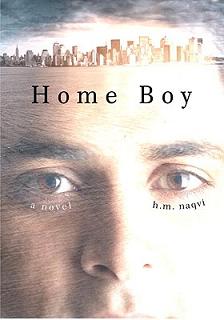Anis Shivani in The Brooklyn Rail:
 Anis Shivani (Rail): The voice in the novel is exceptionally energetic, recalling Nabokov. Was this strong voice always with you? Does it compensate for the loss of American freedom since 9/11?
Anis Shivani (Rail): The voice in the novel is exceptionally energetic, recalling Nabokov. Was this strong voice always with you? Does it compensate for the loss of American freedom since 9/11?
H. M. Naqvi: Since the novel was born at a slam venue as slam poetry, Home Boy is suffused with the vim and cadence of the spoken word. There is also a conscious attempt to fuse lowbrow and highbrow discourse, employ text and lyric, and summon hip hop and Yiddish, Urdu, Hindi, and Punjabi, to create a voice that feels native to New York City. Home Boy can be thought of as dark comedy, comedy set in the shadow of a tragedy. And comedy has unique resonance; it’s powerful stuff.
Rail: Your novel creates certain archetypes of Pakistanis. Khan Sahib (Jimbo’s father), the three main protagonists—Shehzad (Chuck), Jamshed Khan (Jimbo), and Ali Chaudhry (AC)—Mini Auntie, and to a lesser extent Amo (Jimbo’s sister), appear with unprecedented clarity. There is also the archetype of the Pakistani mother—Shehzad’s mother—done better than I’ve seen before. How did you sharpen these characters?
Naqvi: That’s very nice to hear. One of the ambitions of Home Boy is to depict the Pakistani diaspora, from foreman to pediatrician, banker to cabbie, especially because immigrant fiction, recent immigrant fiction in particular, seems sequestered to a certain class, a certain variety of character and experience. Moreover, I wanted to feature other sociocultural experiences within the American purview—the upper-middle-class African-American, the secular Jew, the working-class Arab, the Jersey City Pathan, as well as constituents of East Coast aristocracy—because without them, the attempt to locate the novel in the tradition of immigrant fiction—a tradition that stretches back more than a century to the likes of Henry Roth, and in some ways, Willa Cather—is incomplete, if not entirely false.
More here.
What if Shakespeare wrote The Big Lebowski? Adam Bertocci gives it a go, in case you haven’t read this already.

Here's the bottom line: If things don't start improving very rapidly, then life and limb-threatening infections and deadly dehydration and unnecessary conflict will likely emerge within the affected population on a scale that has the potential of becoming rampant and widespread, resulting in more death and injury that could still be avoided, though time is fast running out. The current path to giving Haiti the relief it desperately needs is simply taking way too long in developing in order to be a reasonable and defensible short term emergency strategy. Each country should, by now, be realizing that it is very much the correct option would be to stage multiple and overwhelmingly robust and well managed multi-national supply lines and helicopter sorties using locations and bases other than Port Au Prince Airport, particularly from the Dominican Republic through the border near Jumani, D.R. It's 7-10 hours by road (depending on the kind of vehicle and size of the load), but it's a darn good road compared to the roads in the Pakistan earthquake affected areas that I've been traveling on for the past four years. Distributing aid from several points over a more widespread area can reach far more people far more quickly.